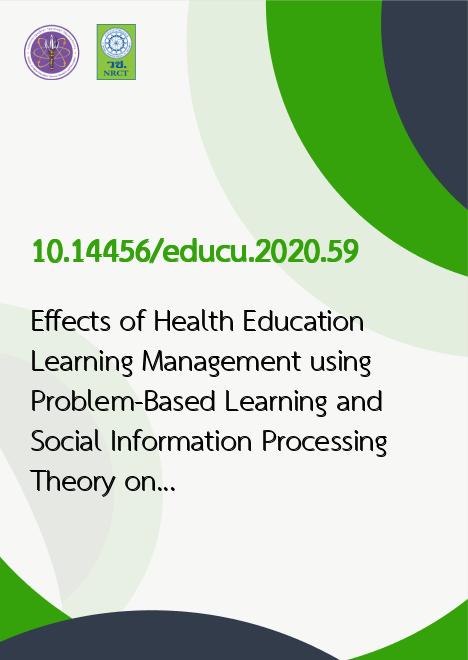
|
Effects of Health Education Learning Management using Problem-Based Learning and Social Information Processing Theory on Learning Achievement and Problem-solving Abilities with Respect to Cyberbullying Behavior of Eighth Grade Students |
|---|---|
| รหัสดีโอไอ | |
| Creator | Sopa Choychod |
| Title | Effects of Health Education Learning Management using Problem-Based Learning and Social Information Processing Theory on Learning Achievement and Problem-solving Abilities with Respect to Cyberbullying Behavior of Eighth Grade Students |
| Contributor | Jintana Sarayuthpitak |
| Publisher | Centre for Education Innovation, Print and Online Media |
| Publication Year | 2563 |
| Journal Title | Journal of Education Studies, Chulalongkorn University |
| Journal Vol. | 48 |
| Journal No. | 2 |
| Page no. | 301-320 |
| Keyword | health education learning management, problem-based learning, social information processing theory, problem solving abilities on cyberbullying behavior |
| URL Website | https://so02.tci-thaijo.org/index.php/EDUCU |
| Website title | Journal of Education Studies, Chulalongkorn University |
| ISSN | 2651-2017 (Online) |
| Abstract | This study is an experimental research. The purposes of this study were: 1) to compare the average score of the learning achievement and problem solving abilities with respect to cyberbullying behavior of an experimental student group before and after implementation of problem-based learning, and 2) to compare the average score of the learning achievement and problem solving abilities with respect to cyberbullying behavior between the experimental group students and the control group students after implementation. The sample included 70 students from the eighth grade of Santirat Wittayalai School in Bangkok. Thirty-five students were assigned to the experimental group to study under the health education learning management system using problem-based learning and social information processing theory, while the other 35 students in the control group were assigned to study with conventional teaching methods. The research instruments comprised eight learning activity plans using problem-based learning and social information processing theory. The data were analyzed by means, standard deviations and t-tests.The research findings are as follows: 1) The mean scores of the learning achievement in the area of knowledge, attitude, practice, and problem-solving abilities with respect to cyberbullying behavior of the experimental group students after learning were significantly higher than before learning, at a .05 level. The mean scores of the learning achievement in the area of knowledge, attitude, practice, and problem-solving abilities with respect to cyberbullying behavior of the control group students after learning were found to have no significant differences compared to before learning, at a .05 level. 2) The mean scores of the learning achievement in the area of knowledge, attitude, practice, and problem-solving abilities with respect to cyberbullying behavior of the experimental group after learning were significantly higher than the control, at a .05 level. |